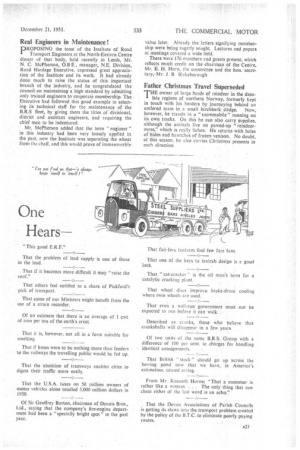One Hears
Page 25

If you've noticed an error in this article please click here to report it so we can fix it.
"This good E.R.F."
That the problem of lead supply is one of those in the lead.
That if it becomes more difficult it may "raise the roof."
That others feel entitled to a share of Pickford's pick of transport.
That some of our Ministers might benefit from the use of a strain recorder.
Of an estimate that there is an average of I cwt. of iron per ton of the earth's crust.
That it is, however, not all in a form suitable for smelting.
That if buses were to be nothing more than feeders to the railways the travelling public would he fed up.
That the abolition of tramways enables cities to digest their traffic more easily.
That the U.S.A. taxes on 50 million owners of motor vehicles alone totalled 5,000 million dollars in 1950.
Of Sir Geoffrey Burton, chairman of Dennis Bros., Ltd., saying that the company's fire-engine department had been a "specially bright spot" in the past year. That fair-fare fanfares find few fare fans.
. That one of the keys to taxicab design is a good lock.
That " cat-cracker" is the oil man's term for a catalytic cracking plant.
That wheel discs improve brake-drum cooling where twin wheels are used.
That even a well-run government must not be expected to run before it can walk.
Described as cranks, those who believe that crankshafts will disappear in a few years.
Of two units of the same B.R.S. Group with a difference of 100 per cent. in charges for handling identical consignments.
That British " stock " should go up across the herring pond now that we have, in America's estimation, ceased erring.
From Mr Kenneth Horne: "That a customer is rather like a woman. . The only thing that can cheat either of the last word is an echo."
That the Devon Associations of Parish Councils is getting its claws into the transport problem created by the policy of the B.T.C. to eliminate poorly paying routes.












































































